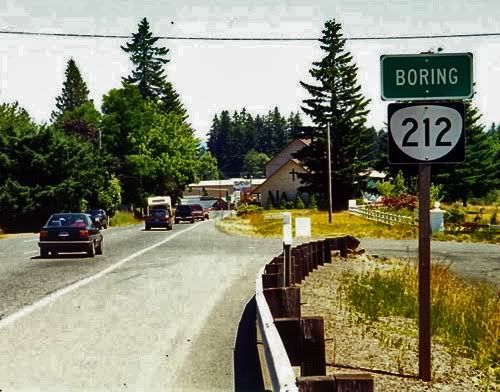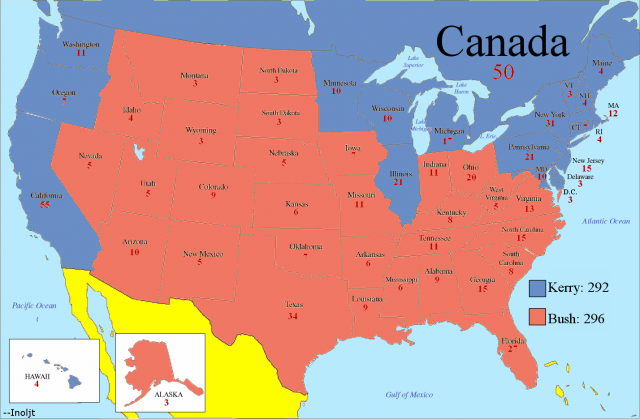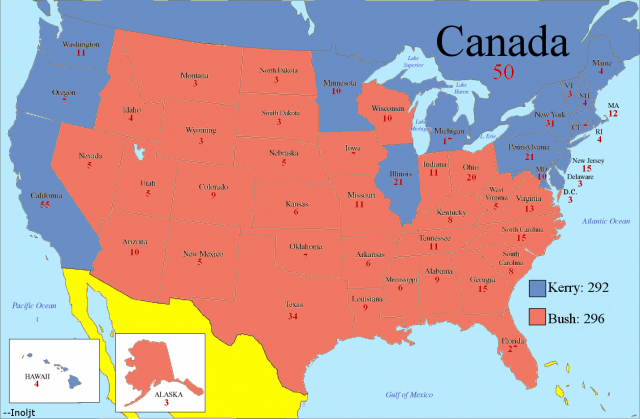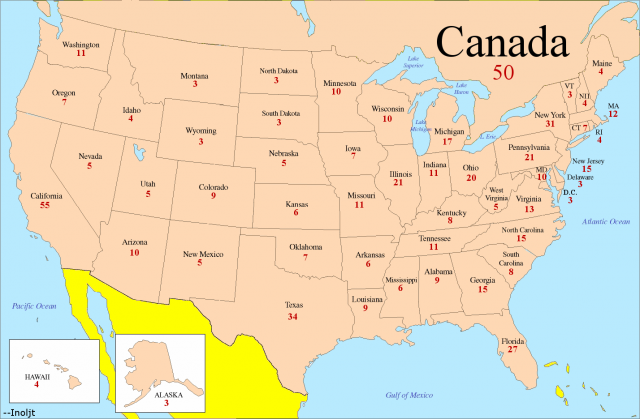Since a few of us are into Canada, and what’s happening up there, I thought I’d set up a separate diary for the discussion….
and predictions….. for the 308 seats in the Canadian House of Commons. (Sorry, I’m not providing Tim Horton’s doughnuts for the winner.) Right now, I’m projecting (just an eyeball guess, I haven’t analyzed the 308 ridings, and I reserve the right to change this until voting starts to close in Atlantic Canada Monday — 8:30 PM newfie time — that’s 4 PM Pacific daylight time, if I’m translating correctly.)
update 5, part 1, revised projection, based on May 1 Nanos and Apr 30 Angus Reid. I’m surprised that the NDP hasn’t continued falling in the daily Nanos tracking, which suggests some recovery yesterday after Layton’s rapid response.)
update 7 — my final predix
Conservative: 142 145 144
Liberal: 75 57 48
NDP: 70 85 100
BQ: 20 15
Greens: 1
(I think Elizabeth May will pull off that district in and North of Victoria. If I’m eyeballing the map right, it’s the district that includes Buchart Gardens.)
Inspired by others, I’m also showing my splits by region:
Cons/Lib/NDP/Other
BC 17/6/12/1 (green)
AL 27/0/1/0
Sas/Man 23/1/4/0
Ontario 60/25/21/0
Quebec 6/5/49/15 (BQ)
Atlantic 10/10/12/0
North 1/1/1/0
(end update 7)
One excellent resource for projections seems to be the guy I’m calling the Canadian Nate, aka Eric Grenier. He’s getting as much play up in Canada as Nate does here. He has daily analysis and a riding by riding projection, on his site, http://www.threehundredeight.b…
PROVISO: Everything in this diary is based on my personal finger to the air guesses. If you want to say that I’m talking out of my whatchamacallit, you’re free to do so, The intent of this diary is for fun — and perhaps for lessons learned that we can use here.
(update 5, part 2: Nanos poll released May 1)
Latest Nanos suggests that the NDP surge has stopped, and may be somewhat reversing but has stabilized at 37/23/31/5.5 (Cons/Lib/NDP/BQ), ref http://www.ctv.ca/mini/electio… Normal provisos apply, the Nanos rolling 3 day poll has very small daily sample sizes (400 nationally in Canada), esp for the individual regions. (e.g. 50/day in BC, if memory serves)
Perhaps the NDP misstep on monetary policy is hurting. Perhaps the stupid Sun thing is throwing the NDP off message. It’s unclear which other parties are benefiting in each region.
Looks like a Cons/Lib bump in the Atlantic is a tight 3-way race, a small lib bump in the NDP is coming back to earth in Quebec, a small Cons lead Liberal recovery in Ontario, Cons dominance in the Praries seems enhanced, and stability in BC -(which suggests a drop in a day or two as good NDP numbers cycle out).-
end update 5
As long as the Conservatives stay below 39%, the key to preventing a Tory majority is a two or three party split in Ontario (which seems to be the case at the moment, but watch out if the gap between the Conservatives and whomever is in 2nd in that province gets above 10 points.)
(update 1 for other seat projections)
(update 2 for the new 308 projection)
308’s 4/30 seat projection (in his notes, Grenier is still anticipating more of a move from the PQ to the NDP.)
144/65/59/40
(Cons/Lib/NDP/BQ)
(end update 2)
EKOS’s 4/29 seat projection:
146/42/109/10/1
(Cons/Lib/NDP/BQ/random Quebec indie)
(end update 1)
update 3 – Angus Reid poll suggests NDP surge continues
http://www.angus-reid.com/poll…
(percentage) 37/19/33/6
(Cons/Lib/NDP/BQ)
No seat projections (that I see) from Angus, but they’re looking at a substantial Tory lead in Ontario, which would bring them close to a majority, with substantial NDP leads in the Atlantic and Quebec, along with a near tie in BC, which I think would get them closer to 90 seats.
Their poll was Apr 28-29, with 2100 “absolutely certain voters”
end update 3
(update 6: Latest EKOS Poll — near statistical tie between Conservatives and NDP!)
They do like 3000 voters in a rolling 3 day poll, so I’m using an extra significant digit.
Cons/Lib/NDP/BQ
34.6/31.4/20.4/5.4
(It’s actually closer among committed voters)
Highlights:
BC: 36.3/15.3/36.5
Alberta: still a Tory runaway
Sas/Man: 46.5/13.5/30.1
Ontario: 39.8/26.7/26.2
Quebec: 14.6/15.2/39.9/22.8
Atlantic: 24.4/28.3/41.3
EKOS doesn’t have their latest seat projection up yet, except to suggest that the NDP s/b within 20 seats of the Tories
Quebec is abandoning the Bloc Quebecois even further and the NDP could virtually sweep that province in a breathtaking development.
Sounds like EKOS is ready to project 60+ NDP seats in Quebec alone.
(end update 6)
update 4 — 308’s “best case scenarios” for the 3 parties



